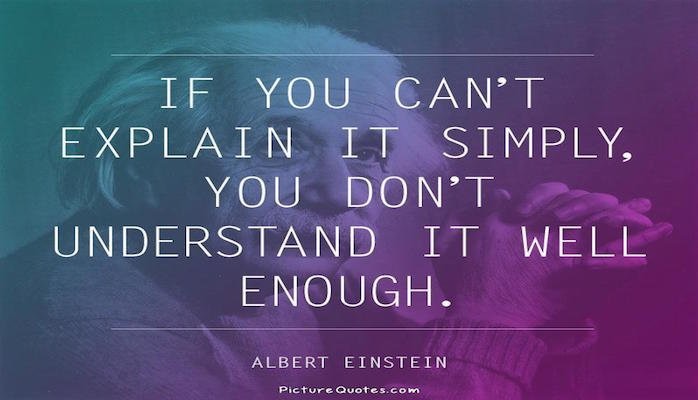
If you can’t explain it simply, you don’t understand it well enough.
What does that mean?
To me, it talks about the straight forward answer. E=mc2. Simple, elegant and still holding true over a century later. Some less esoteric examples? Water flows downhill : gravity. Hot air rises : density. Light going through a glass of water bends : refraction.
The flip side has also been seen in classrooms across the world and throughout history. Someone is called on to answer a question, but they don’t understand the subject very well. Some seem to be prepared to ramble on for hours, hoping to stumble across a suitable answer. You’ve seen this before, haven’t you? You might even have been that poor person, yourself. I know I have been, on many occasions.
Why is simplicity important?
Anyone with a young child knows Einstein’s quote by example, if not by exact words, by the probing questions of the child. Why? Why? Why? Just when you thought you had provided a satisfactory answer, another question appears. Sometimes it’s a question for clarification, other times it’s a question about a completely different topic.
If you can give the child a simple and easily understood answer (by the child, not by you – a lesson that took me years to learn), you won’t get much rest. Why does the sun rise? If you go into orbital mechanics and Kepler’s law, you’re going to get a lot more questions. If you point to a large object nearby and call it the sun, then spin the kid around a few times, you can answer the question at a level the kid can understand.
Where can I apply this in my life?
To me, the greatest questions are directed into oneself. What is my purpose in life? What are my one-year and five-year goals? What do I want to be when I grow up? If you can’t answer these questions simply, you don’t understand yourself well enough.
What things do you know about yourself? Write three things you are absolutely certain that you understand about yourself. Now, explain why what you wrote down is true. In a simple manner. If it gets complex, you don’t understand yourself well enough (or didn’t put much effort into the exercise).
If you get a less-than simple answer, reconsider what you wrote in the first place. Is what you wrote the core of the issue, or a result of the inner you? For example, I might put down I’m a caring person. But I’d have trouble explaining why.
Thinking a bit more about it, I would modify it to say that I was a compassionate person, and that caring was just I example of my compassion. Explaining my compassion would be much easier, as I recognise that everyone is having their own troubles, and many are far worse than mine.
Try your questions again. Try digging a little deeper, until you can get some simple answers. It might be an exercise worth repeating from time to time. You might also consider tackling the questions from the paragraph above this one, just for the exercise – who knows what you might learn about yourself.